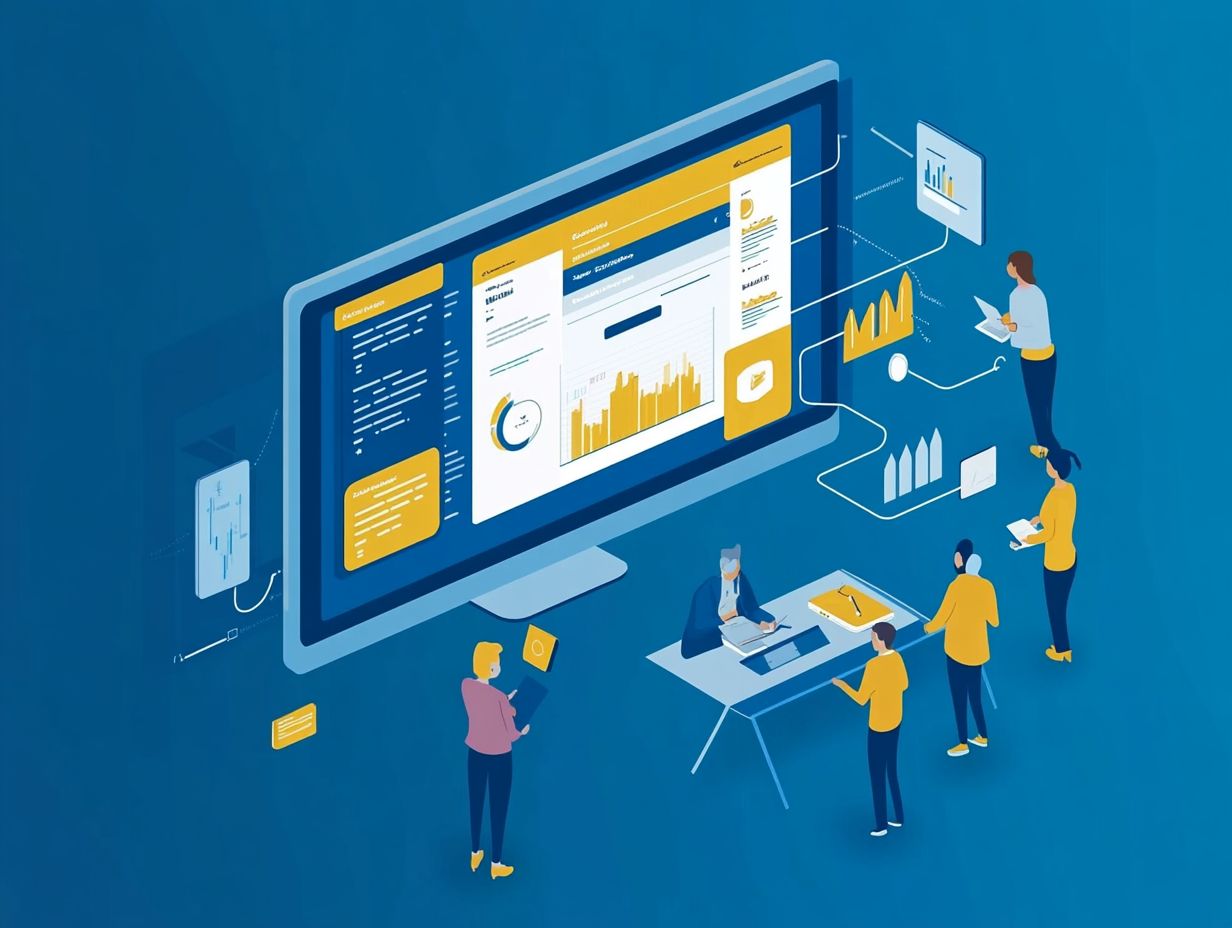76. 5 tools for effortless project management integration
In today s fast-paced work environment, effective project management is essential for your team’s success. With numerous tools available, choosing the right project management integration solution can significantly streamline collaboration and elevate productivity.
This article examines five standout tools Trello, Asana, Basecamp, Monday.com, and Wrike that simplify the project management integration process. It also delves into what project management integration entails, its significance, key features to consider, and valuable tips for selecting the best tool tailored to your business needs.
Explore how these tools can transform your team’s workflow and drive success.
Contents
- Key Takeaways:
- 1. Trello
- 2. Asana
- 3. Basecamp
- 4. Monday.com
- 5. Wrike
- What Is Project Management Integration?
- Why Is Project Management Integration Important?
- What Are the Key Features to Look for in a Project Management Integration Tool?
- How Can Project Management Integration Improve Team Collaboration?
- What Are the Benefits of Using a Project Management Integration Tool?
- How Can Businesses Choose the Right Project Management Integration Tool for Them?
Key Takeaways:

Easily manage your projects with the perfect tool for your team! Choose from top tools like Trello, Asana, Basecamp, Monday.com, and Wrike. To enhance team collaboration and boost productivity, consider 87. 5 essential integrations for agile project teams that provide seamless project management integration.
1. Trello
Trello is an exceptionally versatile project management tool tailored for remote teams, enabling you to manage tasks efficiently through an intuitive interface and visually engaging dashboards that monitor project progress and deadlines.
Its standout features boards, lists, and cards allow you to break down projects into manageable components, making planning and task assignments a breeze. Each board can represent a distinct project, while lists help you categorize different phases or priorities. Cards serve as individual tasks, complete with due dates, attachments, and comments to keep everything organized.
Trello’s capability to connect with various other project management tools further elevates its functionality. This interconnectedness is particularly advantageous for remote collaborations, ensuring that all team members stay aligned and fostering transparency, which ultimately enhances overall productivity.
2. Asana
Asana is a powerful project management tool that significantly enhances team collaboration. With features designed for project timelines, task assignments, and accountability, it allows you to manage workloads effectively and streamline teamwork.
Asana also introduces innovative tools like charts that show the timeline of a project, helping everyone see what needs to be done and when. This feature enables you to grasp dependencies and deadlines at a glance an invaluable asset for any project.
The project health tracking feature helps you monitor progress and spot potential roadblocks early, ensuring that timely interventions can be made.
For remote teams, Asana promotes real-time communication, effectively bridging the gap between team members, no matter their location. Additionally, its integration capabilities with various platforms create a seamless workflow, facilitating smooth information sharing and collaboration that enhances overall productivity.
3. Basecamp

Basecamp is an all-in-one project management powerhouse that makes teamwork a breeze! It elegantly streamlines communication tools and project documentation, making it a critical platform for remote teams striving to manage projects effectively and stay informed.
This platform truly shines in facilitating collaborative project management with intuitive to-do lists where you can effortlessly assign tasks and track progress, ensuring that everyone remains aligned and on target.
The file-sharing features allow you to upload and manage documents with ease, creating a centralized repository where all essential project materials reside in one convenient location.
Message boards act as virtual meeting spaces, enabling you to discuss updates, share ideas, and foster open dialogue. This thoughtful integration of tools simplifies the management of project updates and enhances clarity among stakeholders, making the entire project experience more cohesive and efficient.
Ready to revolutionize your project management? Explore these tools today and check out the 7 best practices for successful tool integration to boost your team’s productivity!
4. Monday.com
Monday.com is your go-to project management software, designed to improve collaboration among remote teams. It allows you to create detailed project timelines and allocate resources effectively, ensuring you hit your project goals.
Its customizable workflows enable you to adapt your task management processes to meet your specific project needs and team dynamics. This flexibility streamlines your organizational structure and enhances productivity, as each team member can follow a workflow that suits their unique work style.
By integrating automated workflows, Monday.com minimizes tedious manual tasks. This gives you the freedom to concentrate on what truly matters. With robust project tracking features, visualizing progress becomes simple, allowing you to make informed, data-driven decisions for timely project completions.
5. Wrike
Wrike stands out as a powerful project management tool that seamlessly merges project evaluations with advanced reporting and analytics. This combination enables you to assess project health and gain data-driven insights for future initiatives.
With its robust task management capabilities, the platform helps you track individual tasks and milestones effortlessly. This ensures that your entire team remains aligned and informed.
The integration of visual tools, such as Gantt charts a type of bar chart that shows a project schedule and dashboards, allows you to monitor progress at a glance. This makes it easy to adjust plans as necessary to keep everything on track.
Wrike boosts collaboration and communication among remote teams, ensuring that everyone has access to the latest updates and can contribute effectively, no matter their location.
This interconnectedness significantly improves overall project efficiency and transparency, making your project management experience smoother and more effective.
What Is Project Management Integration?

Project management integration refers to merging various project management systems and tools to create a seamless workflow. This allows you and your team to manage project resources efficiently and improve teamwork in project management across multiple platforms.
This integration is especially vital for remote teams, who often depend on a variety of digital tools to coordinate efforts across different locations and time zones. Streamlining communication makes real-time updates and notifications easy, ensuring everyone stays aligned, regardless of their physical location.
Consider tools like:
- Trello: helps organize tasks visually.
- Slack: facilitates team communication.
These tools offer integration features that not only centralize project tasks but also enable instant messaging and file sharing within a single interface. Similarly, Asana s integration with Google Drive allows you to attach essential documents directly to tasks, reducing the risk of losing critical information and boosting overall project efficiency.
This interconnectedness fosters a collaborative atmosphere, making it easier for teams to adapt to changes while remaining focused on their objectives.
Why Is Project Management Integration Important?
Project management integration is vital for your project’s success, as it elevates team collaboration, enhances project tracking, and optimizes resource allocation across various management tools. For insights on this, check out these must-have integrations for busy project managers.
When your team is spread across different locations, seamless communication becomes crucial. Integration creates a centralized hub where all project information is readily accessible. This minimizes misunderstandings and ensures that everyone remains aligned.
This clarity sustains momentum and plays a significant role in meeting project milestones and deadlines. By streamlining communication, you ll find it easy to assign tasks effectively, monitor progress in real-time, and adjust timelines as needed.
Ultimately, this fosters a more efficient workflow and ensures timely project completions. Don’t wait to enhance your project efficiency explore these integrations today!
What Are the Key Features to Look for in a Project Management Integration Tool?
When selecting a project management integration tool, you should prioritize key features such as robust communication options and consider the best tools for project management.
Efficient project tracking capabilities and comprehensive task management tools enhance collaboration among remote teams.
A user-friendly interface is crucial; it ensures that all team members, regardless of their technical proficiency, can navigate the software effortlessly.
This prevents a steep learning curve.
Automated workflows simplify repetitive tasks, allowing your teams to concentrate on higher-value work.
Real-time updates keep everyone aligned, significantly minimizing the risk of miscommunication.
These elements boost productivity and elevate project management practices by fostering team accountability and transparency, ultimately leading to more successful project results.
How Can Project Management Integration Improve Team Collaboration?

Project management integration elevates your team’s collaboration by facilitating real-time communication and automating workflows, leveraging popular integrations for team collaboration.
This significantly boosts productivity and keeps everyone aligned with project goals.
For instance, shared calendars offer a clear view of deadlines and team availability.
This allows you to plan your contributions more effectively.
Instant messaging features enable quick exchanges of ideas and help clarify any doubts without the sluggishness of traditional email.
Task assignments streamline responsibilities, ensuring everyone understands their specific roles and deadlines.
This minimizes confusion and enables you and your team members to take ownership of your tasks.
By nurturing such an interactive environment, these tools cultivate a culture of accountability and cooperation, ultimately propelling your projects toward successful completion.
What Are the Benefits of Using a Project Management Integration Tool?
Utilizing a project management integration tool offers you a multitude of benefits, such as enhanced project performance and improved accountability within your team.
Better adherence to deadlines all lead to successful project results.
These tools streamline communication and centralize information, significantly reducing the risk of miscommunication that could derail your project s progress.
With real-time data and insights at your fingertips, you’re enabled to identify potential issues early.
This allows for proactive solutions that safeguard the health of your project.
When your team members feel supported by clear tracking and defined roles, their morale and engagement levels naturally rise.
This fosters a collaborative environment that boosts overall productivity.
That sense of ownership can truly transform project dynamics, as individuals become more invested in delivering quality results while effectively managing their workloads.
How Can Businesses Choose the Right Project Management Integration Tool for Them?
Choosing the right project management integration tool is essential for your business.
It ensures your project management systems align with your unique needs, paving the way for success through enhanced workflows and collaboration.
You’ll want to assess several critical criteria, like scalability, which allows the tool to grow alongside your business.
User-friendliness is also important, so your team can adapt quickly without needing extensive training.
Don t overlook compatibility with your existing systems; seamless integration with current tools can significantly reduce operational bottlenecks.
For instance, companies like Asana and Trello show that when these tools are tailored to the requirements of larger projects, they can boost efficiency and improve overall outcomes.
Organizations that prioritize these criteria often experience smoother workflows and stronger team collaboration.
Ready to elevate your project management? Start exploring the best tools today!





